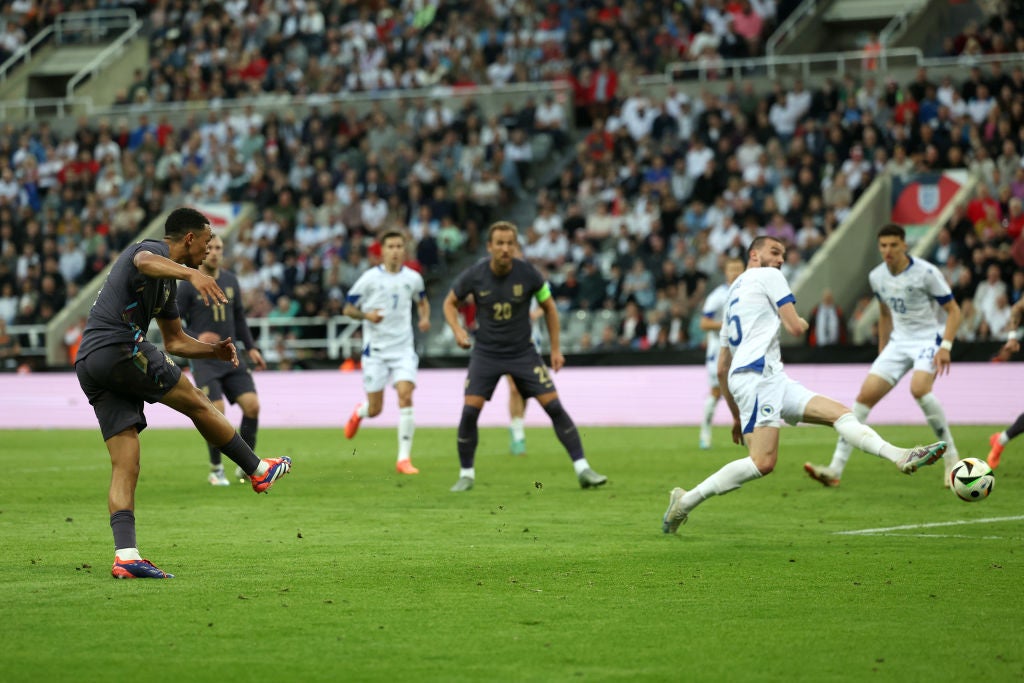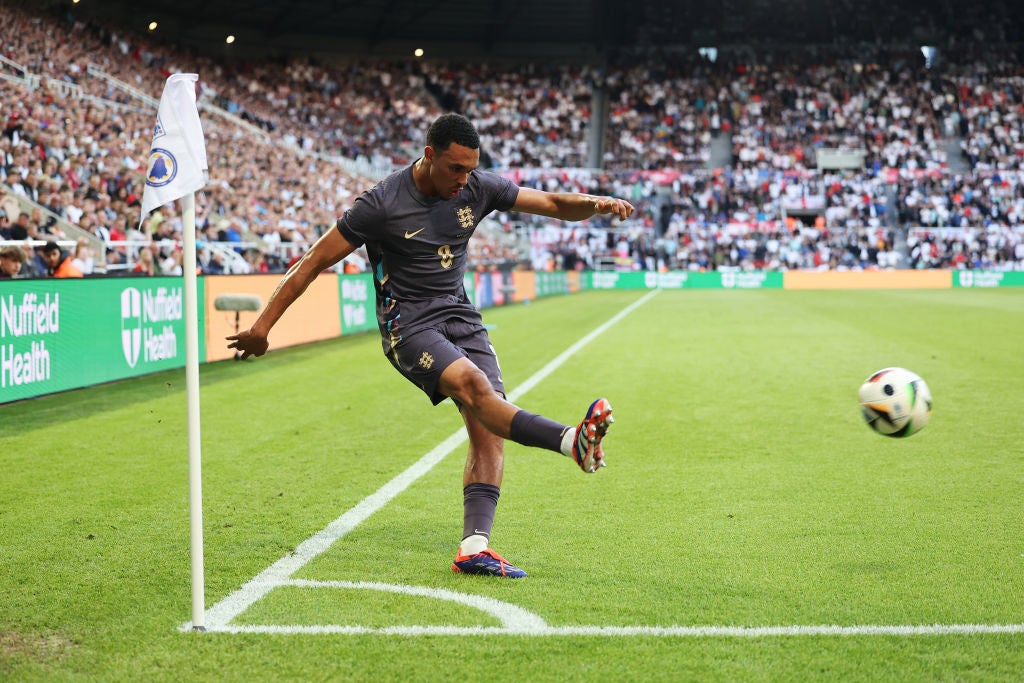If you missed Trent Alexander Arnold’s performance last night, picture Marco van Basten volleying the skin off a high ball from a tight angle into the far corner; picture Hakim Ziyech swerving a 60-yard pass onto his teammate’s big toe; picture Lionel Messi’s invisible throughball to slice open Netherlands. Well, Alexander-Arnold did all of that in one night.
Even allowing for a little journalistic hyperbole, and noting that he was up against the plucky but toothless Bosnia and Herzegovina in a friendly, this felt significant.
England’s 3-0 win didn’t tell us much that we didn’t already know. Kieran Trippier is an adequate left-back. Jarrod Bowen deserves to go but might not. Eberechi Eze is pure vibes. But what it did show was the effect of Alexander-Arnold as a No 6, an intriguing solution to Gareth Southgate’s conundrum of who to play alongside Declan Rice behind England’s preferred No 10, Jude Bellingham.
Deployed there – next to Conor Gallagher with Rice rested – Alexander-Arnold played at a walking pace Andrea Pirlo would be proud of, socks rolled down, using every bevel of his boot to spray passes to far-flung corners of the pitch. For much of the game he stood, scanned and sent the ball as far as his throwing leg could in a performance to be measured not by distance run but yards gained.
For a 25-year-old Premier League and Champions League winner who has been outstanding for Liverpool, under one of the best managers in the world, 24 international caps is a meagre return so far. The 20-year-old Bellingham already has 29 caps; Bukayo Saka has 32 and Phil Foden has 33. That is down to a few things but mostly Southgate’s lack of faith in Alexander-Arnold’s defensive ability, coupled with England’s luxurious choice at right-back.
But then this is the great challenge of international football, muddling together a team who inevitably don’t fit, with squads that appear to have been compiled while the recruitment staff were drunk. For a while Scotland’s two best players were Andy Robertson and Kieran Tierney, both unadulterated left-backs. The entire backdrop to any English millennial’s childhood was the fruitless search for a left-footer to balance an otherwise world-class midfield, a ride which included stops at Alan Thompson and Seth Johnson. The great Spain team of the 2008-12 era was exceptional in almost every position, but they relied on the workmanlike Joan Capdevila at left-back because he was seemingly the only man of working age with a Spanish passport who played the role.
The solution, usually, is not to cram your 11 most talented players onto the pitch at any cost, squeezing round pegs into square holes. England know this lesson better than most, given the pained Scholes-Gerrard-Lampard years.

Yet Alexander-Arnold doesn’t seem like a compromise in the No 6 role; he feels like a discovery. His long-term position has often been debated but rarely has the holding role been proffered with any serious conviction. It should be: from there the game unfolds in front of him like a piece of paper, and he is free to draw the pictures others can’t see.
He can drop between the centre-backs and dictate. He can move forwards and link play, backing up attacks around the edge of the box. And maybe it even suits Alexander-Arnold’s defensive game, by removing him from back-post duels and reinventing him as more of a central space-plugger. Against Bosnia he made a couple of wily interceptions, reading the situation before it happened.
With Alexander-Arnold loitering in deep pockets, it would free Rice to forage forwards. Think back to England’s opening game of the last Euros and it was a surging Kalvin Phillips who set up Raheem Sterling’s opener against Croatia, while Rice held deep. Since then Rice has grown into more than just a sitter, a player with the ability to dribble and break lines just like Phillips did that day. And when he goes, he’ll need a partner to stay back.
Alexander-Arnold has other traits England might need in Germany. He takes accurate set-pieces, a potential weapon in a tournament that will be defined by small margins. And he brings a certain composure, a swagger, the sort that ripples through a team. He has already done it all at club level, and that experience brings its own sense of calm in adversity.

There are other options to pair with Rice. Kobbie Mainoo is one, although he is more like a direct understudy, and his goal in the FA Cup final showed that when he ran from one box to the other. Gallagher is not a disciplined holder but an all-action scurrier who looks like he is trying to colour in a heat map. Curtis Jones is a little more advanced, and Bellingham’s strengths lie further forward too. Phillips and Jordan Henderson have faded from the picture, while Adam Wharton may be too green for this tournament.
Which leaves Alexander-Arnold. For the final minutes of the game he was deployed at right-back, so far removed from the action that he had to play mind-boggling switches just to feel involved. And he did, because he could. England don’t have anyone else quite like him.
